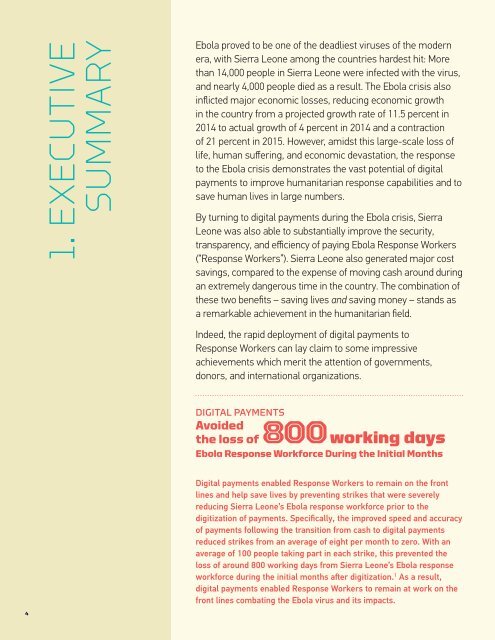LEONE
1U6Dtu2
1U6Dtu2
Create successful ePaper yourself
Turn your PDF publications into a flip-book with our unique Google optimized e-Paper software.
1. EXECUTIVE<br />
SUMMARY<br />
Ebola proved to be one of the deadliest viruses of the modern<br />
era, with Sierra Leone among the countries hardest hit: More<br />
than 14,000 people in Sierra Leone were infected with the virus,<br />
and nearly 4,000 people died as a result. The Ebola crisis also<br />
inflicted major economic losses, reducing economic growth<br />
in the country from a projected growth rate of 11.5 percent in<br />
2014 to actual growth of 4 percent in 2014 and a contraction<br />
of 21 percent in 2015. However, amidst this large-scale loss of<br />
life, human suffering, and economic devastation, the response<br />
to the Ebola crisis demonstrates the vast potential of digital<br />
payments to improve humanitarian response capabilities and to<br />
save human lives in large numbers.<br />
By turning to digital payments during the Ebola crisis, Sierra<br />
Leone was also able to substantially improve the security,<br />
transparency, and efficiency of paying Ebola Response Workers<br />
(“Response Workers”). Sierra Leone also generated major cost<br />
savings, compared to the expense of moving cash around during<br />
an extremely dangerous time in the country. The combination of<br />
these two benefits – saving lives and saving money – stands as<br />
a remarkable achievement in the humanitarian field.<br />
Indeed, the rapid deployment of digital payments to<br />
Response Workers can lay claim to some impressive<br />
achievements which merit the attention of governments,<br />
donors, and international organizations.<br />
DIGITAL PAYMENTS<br />
Avoided<br />
the loss of 800 working days<br />
Ebola Response Workforce During the Initial Months<br />
Digital payments enabled Response Workers to remain on the front<br />
lines and help save lives by preventing strikes that were severely<br />
reducing Sierra Leone’s Ebola response workforce prior to the<br />
digitization of payments. Specifically, the improved speed and accuracy<br />
of payments following the transition from cash to digital payments<br />
reduced strikes from an average of eight per month to zero. With an<br />
average of 100 people taking part in each strike, this prevented the<br />
loss of around 800 working days from Sierra Leone’s Ebola response<br />
workforce during the initial months after digitization. 1 As a result,<br />
digital payments enabled Response Workers to remain at work on the<br />
front lines combating the Ebola virus and its impacts.<br />
4



